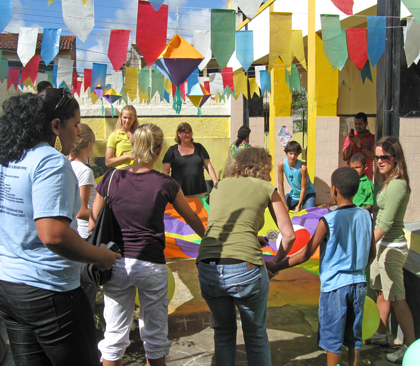By Barb Arland-Fye

On study abroad trips to Brazil, creativity and compassion go a long way, occupational therapy graduate students at St. Ambrose University in Davenport have discovered.
Rachel Herberg said she stepped outside her comfort zone to participate in the study abroad experience and developed a deeper appreciation for her own life. She returned to Brazil a second time for independent study.
Her professor, Christine Urish, has been organizing study abroad trips to Brazil at least every other year since 2007 because of the valuable lessons students learn beyond their American classrooms. It is a collaborative effort with Santa Cruz Estate University (UESC) in northeastern Brazil.
Students visit hospitals, clinics and even a prison. They engage in community service in the slums, serving people of all ages with physical and/or mental challenges, addictions or injuries.
They’ve conducted education sessions for parents and therapists concerning behavior management and improvement of a client’s focus. They’ve delivered a communications board that St. Ambrose engineering students designed for a Brazilian girl with cerebral palsy who can’t talk.
“When we tried it out (the girl’s) mom just started sobbing. Intuitively she knows what her daughter wants, but for her daughter to articulate and make her needs clearly known … it’s easier for this child as a result of this project,” Urish said.
During one trip to Brazil, Urish and her students met Mr. Milton, who lost his arms and legs in an industrial accident. Despite his losses, he expresses gratitude to be alive.
In June, Urish and her students will present him with prosthetic arms created through a collaborative effort between St. Ambrose’s occupational therapy and engineering departments and the engineering department of Sweet Briar College in Virginia.
“When we asked him, ‘What’s the first thing you want to be able to do when you have your arms?’ he said, ‘Brush my teeth.’… That’s what occupational therapy is all about – helping people to be independent,” Urish said.
The gratitude of the Brazilian people whose lives they’ve touched deeply impressed Rachel.
“We gave one therapist a Ziploc bag full of crayons; she began to cry with appreciation. I could have never imagined such appreciation for a $4 bag of crayons,” Rachel said.
“The area we visit is predominantly Catholic; the majority of the people are very devout in their faith. Anyone you speak to says they will pray for you, even if you are happy and well. In the clinic, many people with disabling conditions are grateful that God still allows them to be with the people they love, and that he has spared their life. This is not a view we see as often in the United States, and it has made me change the way I approach patients, their families, and my own life. No matter the hardships I encounter, I am alive and able to serve others.”
On her second trip to Brazil, Rachel taught therapists how to adapt toys with a micro-switch, Urish said. “These therapists are so creative – and they make the most amazing things out of nothing. I have a therapist who needed a positioning device for working with children and adults. She took an old pair of blue jeans, sewed the top shut and stuffed it with rags to make a positioning device.”
Nam Nguyen participated in the 2010 study abroad to Brazil and was amazed at the creativity of the occupational therapists there. “I remember visiting one clinic where the therapist used part of an empty pop bottle and attached it to a patient that lost both arms due to a burn. The pop bottle simulated an arm for the patient to use. In the United States, we would most likely provide prosthesis for the patient where (in this part of) Brazil, the technology was not available. We also visited a mental health clinic where they used old magazine pages to create a placemat. It was amazing to see how the occupational therapists stretch their resources as much as possible.”
When she returned home, Nam said she wanted to continue to give back to those who need resources. “With the help of my family, we collect items to give to the occupational therapists in Brazil to use for treatments such as toys, books, nail polish, art supplies, crafts, etc.
“The gift of giving reflects strongly the St. Ambrose University mission statement in that we enrich the lives of others. Not only does our service in Brazil affect our lives, but it means the world to others who receive it. The best feeling in the world is providing the gift of giving and knowing the impact that affects others,” Nam said.
“I can tell you that a project of this nature has an incalculable importance, because people get involved for a common interest: improving people’s lives. It can happen through the exchange of knowledge, or through solutions to change the life of a particular patient, or just for the fact of friendship that is born among human beings,” said Patrícia Argôlo Rosa, a UESC professor who coordinates the study abroad program with Urish.
Supplies needed for Brazil occupational therapy trip
Professor Christine Urish of St. Ambrose University’s Master of Occupational Therapy Department said she and her students would appreciate donations of the following items to deliver to Brazilian therapists and clients. Items are delivered during study abroad trips to Brazil. The next one is in June.
1. Crayons, scissors, pens, pencils
2. Nail polish – all colors – even some that maybe were used only once
3. Games with no complex rules – checkers, chess, Chutes & Ladders, Candyland, Twister, mancala, Connect 4, decks of cards
4. Theraband
5. Reachers, dressing sticks, long-handled shoe horns, long-handled sponges
6. Other therapy supplies, which Urish would be willing to discuss with anyone making a donation. Cash donations also are welcome to purchase materials in Brazil. Contact Urishchristinek@sau.edu or 563-333-6281.








